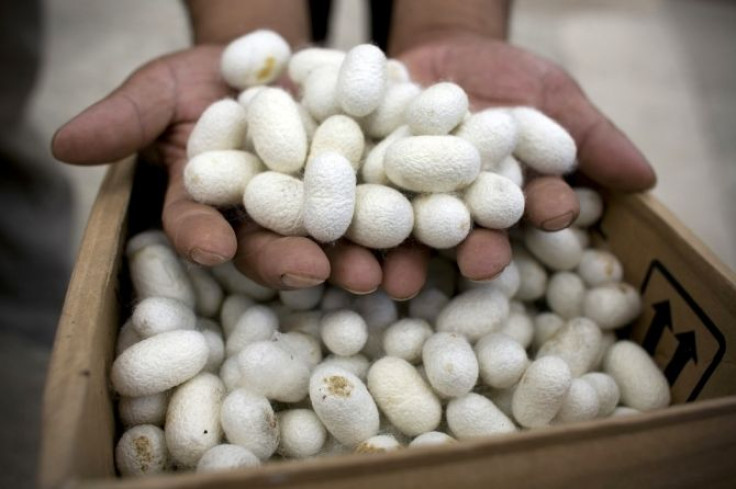Scientists Snub Cold Chain: Successfully Preserve Vaccines in Silk Sheets

Researchers have discovered a way to preserve vaccines using silk, a development that could free vaccines and antibiotics from requiring refrigeration and save millions of children in poor countries where reliable refrigeration for vaccines isn't always available.
Lead author David Kaplan of Tufts University, in Massachusetts, and his team developed a way to pack medicine in tiny silk pouches in a way that makes vaccines and antibiotics almost indifferent to heat, protecting them from damage in temperatures up to 140 degree Fahrenheit.
Vaccines and antibiotics generally need to be refrigerated to prevent their chemical structures from unraveling to maintain their potency and effectiveness.
However, scientists writing in the Proceedings of the National Academy of Sciences found that mixing the vaccine or antibiotics with a silk protein called fibroin made a matrix that can trap a biological molecule within its tiny silk pockets keeping the medicine molecules protected from heat damage and degradation.
Kaplan explains that it is essential that chemicals in injectable vaccines and antibiotics stay in the right folded shape, otherwise they become ineffective. When these chemicals are exposed to heat or moisture, the folds in the chemical can unfold and the drugs or vaccine can no longer challenge the bacteria or viruses they were made to fight.
He explains that the new silk-based stabilizer is even better than normal freeze-drying at pinning the chemical structure in place and by minimizing residual moisture has successfully preserved the measles, mumps and rubella (MMR) vaccine.
Researchers said with the new silk technology, MMR vaccines were able to retain their potency at temperatures over 100 degrees for two weeks or more, but without the stabilizers temperatures that high would eliminate the vaccines effectiveness in less than a day.
Experts say that keeping medications cold from production until they are used in treatment is a costly process that accounts for as much as 80 percent of the price of vaccinations. Furthermore, breaks in the cold chains, are believed to destroy almost half of the vaccines produced worldwide, according to the World Health Organization.
Researchers created the new silk stabilizer by boiling silkworm cocoons in a sodium carbonate solution to separate the protein fibroin from another protein called sericin. Then they treated fibroin with salt and mixed it with the vaccine or antibiotic to be preserved and spread the result as film before freeze-drying it.
Researchers said prolonged storage at just 77 degrees will make even the freeze-dried version of the MMR vaccine break down, making it retain only 60 percent to 75 percent of its potency after six months. When the freeze-dried version of the MMR vaccine was kept at 113 degrees Fahrenheit or 45 degrees Celsius, it became practically worthless after six months, but when stored in the silk sheets, they still retained about 85 percent of their potency after six months, regardless of temperature.
Researchers had tried to same silk-based stabilizer on common antibiotics like tetracycline and penicillin and got similar results.
Furthermore, researchers said that fibroin is harmless to people, so there is a small chance that the new stabilizer will produce adverse side effects.
"New studies are already under way," Kaplan said in a statement. "We have already begun trying to broaden the impact of what we're doing to apply to all vaccines. Based on what we've seen with other proteins, peptides, and enzymes, there's no reason to believe that this wouldn't be universal. This could potentially eliminate the need for a cold-chain system, greatly decreasing costs and enabling more widespread availability of these life-saving drugs."



























